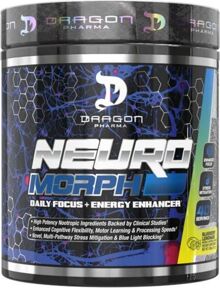Next Generation Nootropic Catalyst
Daily Focus + Energy Enhancer
- High Potency Nootropic Ingredients Backed by Clinical Studies Ɨ
- Enhanced Cognitive Flexibility, Motor Learning & Processing Speeds Ɨ
- Novel, Multi-Pathway Stress Mitigation & Blue Light Blocking Ɨ
With the evolution of technology, we’ve come to live in an over stimulated world. From stimulants like copious amounts of coffee and energy drinks, environment related elevations in stress and the constant strain we are placing on our eyes with blue light in this digital age, it’s no wonder we are all dealing with a lot. The result of this high stress and over-stimulation is brain fog, constantly elevated cortisol levels, general anxiety and accelerated long-term vision deterioration from the immense amount of digital blue light we are exposed to...not a trio conducive to long term health.
While many have become accustomed to intaking highly stimulatory products for a mental ‘boost’ such as energy drinks loaded with 300mg+ of caffeine, this often causes more harm than good, further increasing cortisol, causing anxiety from too much caffeine and doing nothing for the brain fog you were trying to clear. Enter NeuroMorph, the modern solution to this brain fog, stress and blue light stress.
NeuroMorph has been formulated using novel, cutting edge nootropics for enhanced cognition, adaptogenic herbs for stress mitigation, antioxidant support for cellular health and a patented lutein for combating the long-term damage from blue light emitted by today’s digital devices. The naturally derived caffeine in a serving of NeuroMorph for focus and alertness is equivalent to an average cup of coffee The result is a nootropic formula that helps you clear that brain fog, lock in with tunnel vision and feel an improved sense of vitality via reduced perceived stress. Ɨ
NEUROMORPH RESEARCH SUMMARY
L-Tyrosine
Naturally occurring amino acid found in the diet that is metabolized to produce catecholamines such as dopamine and adrenaline1
Seems to provide a 'safety buffer' of building blocks that can prolong the anti-stress effect of catecholamines by delaying depletion2
Shown to help decrease serotonin to dopamine ratio during exercise, decreasing the perception of fatigue3
NooGandha (Withania somnifera)
A novel version of the ayurvedic herb, ashwagandha, Noogandha is bonded with phospholipids to increase bioavailability and absorption rate. Process also makes crossing the blood-brain barrier possible, which can make this extract of higher potency than other ashwagandha.
Next generation TWO in ONE organic ashwagandha root extract offering both adaptogenic benefits along with concentrated compounds that bring about nootropic cognitive performance benefits
Shown to help maintain healthy levels of the stress hormone, cortisol4
Supports reduced stress and anxiety in adults subjects5
Alpinia galanga Extract
Native to southeast Asia, this ayurvedic herb is a member of the ginger family and contains extracts in the rhizome of the plant6
Elevates cognitive function including amplified attention and memory forming7
When combined with caffeine, Alpinia galanga impedes “caffeine crash” and improves sustained attention at the 3 hour mark8
Suggested to possibly have neuroprotective effects for brain health9,10
Shown to replenish glutathione (GSH) levels and downregulate lipid peroxidation in the brain11
Lion’s Mane (Hericium erinaceus)
Yamabushitake, more commonly known as Lion’s Mane, is a mushroom that grows on old or dead broadleaf trees, and is found in Japan and China
Ultra-versatile, showing promise for antibiotic, anticarcinogenic, antidiabetic, antifatigue, antihypertensive, antihyperlipidemic, antisenescence, cardioprotective, hepatoprotective, nephroprotective, and neuroprotective properties and improvement of anxiety, cognitive function, and depression12
Shown to significantly reduce the rate of cognitive decline and neuro degeneration13
Enhances neuronal communication and nerve regeneration via improved myelination14
Potentially an effective anti-depressant through the modulation of monoamine neurotransmitters and proinflammatory cytokines as well as the regulation of brain-derived neurotrophic factor (BDNF) pathways15
InnovaTea (Naturally Derived Caffeine)
Unique, all-natural source of Caffeine produced from tea leaves (Camellia sinensis)
Creates alertness and wakefulness via antagonizing the adenosine receptors in the brain16
Decreases the sensation of fatigue and increases mental performance17
Shown to help improve verbal memory and visuospatial reasoning18
Supports elevated mood state19
Spectra
Plant based, scientifically validated blend of fruits, vegetables, and herbs shown to inhibit free radical production and optimize cellular metabolic activity within the human body20
Stimulates antioxidant activity within the human body and efficient cellular oxygen consumption21
XanMax (20% Lutein; 4% Zeaxanthin)
A 100% natural Lutein concentrate obtained from Marigold Flowers (Tagetes erecta)
Promotes macular health and prevents free-radical damage in eyes22,23
Aid in eye’s ability to filter harmful high-energy blue wavelengths of light and help protect and maintain healthy cells in the eye24
Inositol
Member of the B-complex family with dietary sources from both animal and plant foods; Found in all cell membranes, with the highest concentrations in the brain and central nervous system, where it plays an important role in neurotransmitter signaling25
Shown to be a critical part of proper action of insulin, lipid metabolism and the maintenance of cellular calcium balance26
Black Pepper Extract
Increases the bioavailability of other ingredients and increases time active in system by downregulating enzymes27
Shown to increase absorption by slowing intestinal transit rate and thus prolonging the time said compounds are exposed to the potential uptake28
Inhibits glucuronidation in the liver, a process that attaches a molecule (glucuronide) to drugs to signal for their urinary excretion. This is a natural process that safeguards the body from too high of levels of drugs and supplements, but on the downside, it inhibits all uptake and renders some supplements useless.29 This is a good and bad thing depending on the substance, but in the case of NeuroMorph, it’s a very good thing.
NEUROMORPH REFERENCES
(1) Fernstrom, J. Tyrosine, Phenylalanine, and Catecholamine Synthesis and Function in the Brain. J. Nutr. 2007, 137 (6), 1539S-1547S. https://doi.org/10.1093/jn/137.6.1539S.
(2) Agharanya, J. Changes in Catecholamine Excretion after Short-Term Tyrosine Ingestion in Normally Fed Human Subjects. Am. J. Clin. Nutr. 1981, 34 (1), 82–87. https://doi.org/10.1093/ajcn/34.1.82.
(3) Cordeiro, L. Physical Exercise-Induced Fatigue: The Role of Serotonergic and Dopaminergic Systems. Braz. J. Med. Biol. Res. 2017, 50 (12). https://doi.org/10.1590/1414-431X20176432.
(4) Auddy, B. A Standardized Withania Somnifera Extract Significantly Reduces Stress-Related Parameters in Chronically Stressed Humans: A Double-Blind, Randomized, Placebo-Controlled Study. J. Am. Nutraceutical Assoc. 2008, 11 (1).
(5) Chandrasekhar. A Prospective, Randomized Double-Blind, Placebo-Controlled Study of Safety and Efficacy of a High-Concentration Full-Spectrum Extract of Ashwagandha Root in Reducing Stress and Anxiety in Adults. Indian J. Psychol. Med. 2012, 34 (3), 255–262. https://doi.org/10.4103/0253-7176.106022.
(6) Hadjzadeh, M.-A.-R. The Effects of Aqueous Extract of Alpinia Galangal on Gastric Cancer Cells (AGS) and L929 Cells in Vitro. Iran J. Cancer Prev. 2014, 7 (3), 142–146.
(7) Chudiwal, A. Alpinia Galanga Willd.- An Overview on Phyto-Pharmacological Properties. J. Nat. Prod. Resour. 2010, 1 (2), 143–149.
(8) Srivastava, S. Effect of Alpinia Galanga on Mental Alertness and Sustained Attention With or Without Caffeine: A Randomized Placebo-Controlled Study. J. Am. Coll. Nutr. 36 (8), 631–639. https://doi.org/10.1080/07315724.2017.1342576.
(9) Mundugaru, R. Neuroprotective Functions of Alpinia Galanga in Forebrain Ischemia Induced Neuronal Damage and Oxidative Insults in Rat Hippocampus. Indian J. Pharm. Educ. Res. 2018, 52 (4). https://doi.org/10.5530/ijper.52.4s.79.
(10) Hanish Singh, J. Neurotransmitter Metabolic Enzymes and Antioxidant Status on Alzheimer’s Disease Induced Mice Treated with Alpinia Galanga (L.) Willd. J. Phytother. Res. 2011, 25 (7), 1061–1067. https://doi.org/10.1002/ptr.3364.
(11) Kaushik, P. Protective Effect of Alpinia Galanga in STZ Induced Diabetic Nephropathy. Pak. J. Biol. Sci. 2013, 16 (16), 804–811. https://doi.org/10.3923/pjbs.2013.804.811.
(12) Friedman, M. Chemistry, Nutrition, and Health-Promoting Properties of Hericium Erinaceus (Lion’s Mane) Mushroom Fruiting Bodies and Mycelia and Their Bioactive Compounds. J. Agric. Food Chem. 2015, 63 (32), 7108–7123. https://doi.org/10.1021/acs.jafc.5b02914.
(13) Mori, K. Improving Effects of the Mushroom Yamabushitake (Hericium Erinaceus) on Mild Cognitive Impairment: A Double-Blind Placebo-Controlled Clinical Trial. J. Phytother. Res. 2009, 23 (3), 367–372. https://doi.org/10.1002/ptr.2634.
(14) Kolotushkina, E. The Influence of Hericium Erinaceus Extract on Myelination Process in Vitro. Fiziol Zh 2003, 49 (1), 38–45.
(15) Chiu, C. Erinacine A-Enriched Hericium Erinaceus Mycelium Produces Antidepressant-Like Effects through Modulating BDNF/PI3K/Akt/GSK-3β Signaling in Mice. Int. J. Mol. Sci. 2018, 19 (2). https://doi.org/10.3390/ijms19020341.
(16) Fredholm, B. Astra Award Lecture. Adenosine, Adenosine Receptors and the Actions of Caffeine. J. Pharmacolological Toxicol. Methods 76 (2), 93–101. https://doi.org/10.1111/j.1600-0773.1995.tb00111.x.
(17) Maridakis, V. Sensitivity to Change in Cognitive Performance and Mood Measures of Energy and Fatigue in Response to Morning Caffeine Alone or in Combination with Carbohydrate. Int. J. Neurosci. 119 (8), 1239–1258. https://doi.org/10.1080/00207450802333987.
(18) Giles, G. Caffeine Promotes Global Spatial Processing in Habitual and Non-Habitual Caffeine Consumers. Front. Hum. Neurosci. 2013, 7 (694). https://doi.org/10.3389/fnhum.2013.00694.
(19) Dodd, F. A Double-Blind, Placebo-Controlled Study Evaluating the Effects of Caffeine and L-Theanine Both Alone and in Combination on Cerebral Blood Flow, Cognition and Mood. Psychopharmacol. Berl. 232 (14), 2563–2576. https://doi.org/10.1007/s00213-015-3895-0.
(20) Nemzer, B. New Insights on Effects of a Dietary Supplement on Oxidative and Nitrosative Stress in Humans. Food Sci. Nutr. 2014, 2 (6), 828–839. https://doi.org/10.1002/fsn3.178.
(21) Nemzer, B. Decrease of Free Radical Concentrations in Humans Following Consumption of a High Antioxidant Capacity Natural Product. Food Sci. Nutr. 2014, 2 (6), 647–654. https://doi.org/10.1002/fsn3.146.
(22) Xue, C.; Rosen, R.; Jordan, A.; Hu, D.-N. Management of Ocular Diseases Using Lutein and Zeaxanthin: What Have We Learned from Experimental Animal Studies? J. Ophthalmol. 2015, 2015, 523027. https://doi.org/10.1155/2015/523027.
(23) Jia, Y.-P.; Sun, L.; Yu, H.-S.; Liang, L.-P.; Li, W.; Ding, H.; Song, X.-B.; Zhang, L.-J. The Pharmacological Effects of Lutein and Zeaxanthin on Visual Disorders and Cognition Diseases. Mol. Basel Switz. 2017, 22 (4). https://doi.org/10.3390/molecules22040610.
(24) Stringham, J. Macular Carotenoid Supplementation Improves Visual Performance, Sleep Quality, and Adverse Physical Symptoms in Those with High Screen Time Exposure. Foods 2017, 6 (7). https://doi.org/10.3390/foods6070047.
(25) Majerus, P. The Role of Inositol Signaling in the Control of Apoptosis. Adv. Enzyme Regul. 2008, 48 (10). https://doi.org/10.1016/j.advenzreg.2008.04.001.
(26) Hanley, M. Neural Function: Metabolism and Actions of Inositol Metabolites in Mammalian Brain. Philos. Trans. R. Soc. B 320 (1199), 381–398. https://doi.org/10.1098/rstb.1988.0083.
(27) Kesarwani, K. Bioavailability Enhancers of Herbal Origin: An Overview. Asian Pac. J. Trop. Biomed. 2013, 3 (4), 253–266. https://doi.org/10.1016/S2221-1691(13)60060-X.
(28) Mehmood, M. Pharmacological Basis for the Medicinal Use of Black Pepper and Piperine in Gastrointestinal Disorders. J. Med. Food 13 (5). https://doi.org/10.1089/jmf.2010.1065.
(29) Han, H. The Effects of Black Pepper on the Intestinal Absorption and Hepatic Metabolism of Drugs. Expert Opin Drug Metab Toxicol. 2011, 7 (6), 721–729. https://doi.org/10.1517/17425255.2011.570332.



